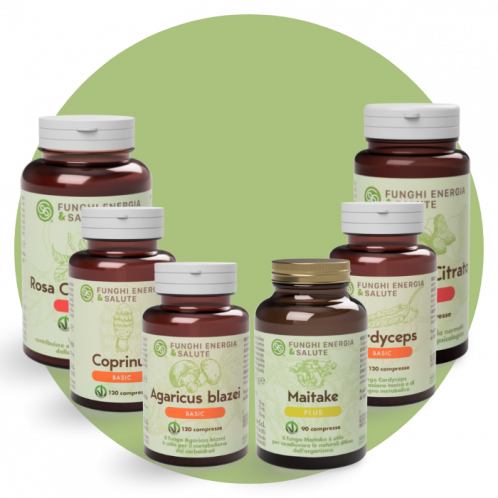Certified Natural products veganOK
030 9881073 Monday to Friday from 09:00 to 17:30
Toggle Nav 



Skip to Content
Language
EN
How can we help you?
Search
Subscribe to the Newsletter
to get immediately a discount code
on your first purchase
to get immediately a discount code
on your first purchase
Blog
Blood sugar, insulin and Medicinal Mushrooms
- Home
- News & Press
- Blood sugar, insulin and Medicinal Mushrooms
BY DR. WALTER ARDIGÒ
Mycotherapy for glycemic control: mechanisms of action, two successful clinical stories
Insulin resistance, metabolic syndrome and diabetes are some of the most common illnesses of recent times. There are many causes: incorrect diet, sedentary lifestyle, genetic predisposition, sometimes even somatization of anxiety combined with intake of unhealthy food on a daily basis.
One of the most overlooked but equally important causes, is the production of free radicals, which tend to block insulin, altering the cellular receptor on which it acts, present on the surface of every cell in the body.
Free radicals damage these receptors which have the task of promoting the passage of glucose from the blood to cells at the level of the brain, muscle, heart and the whole body. By hindering this step, they first cause insulin resistance and then diabetes.
The first to discover and demonstrate the benefits of Mycotherapy in the treatment of diabetes and in all these cases were Japanese and Korean scientists, who have been studying the problem for decades, defining the powers of the Medicinal Mushrooms Maitake, Agaricus blazei and Cordyceps. Coprinus, studied in Europe, was already used extensively in the wise art of traditional natural remedies.
The powers of Medicinal Mushrooms for blood sugar control, insulin and diabetes
Maitake is a precious medicinal mushroom: it strengthens the functions of the pancreas, reduces hyperglycemia, improves the health of the beta cells that produce insulin. Furthermore, it compensates for energy deficiencies because it burns fat for energy.
Cordyceps exerts a hypoglycemic action and also has a vasodilator effect, which promotes optimal blood flow throughout the body. It also improves blood circulation in precious organs such as the heart, brain, eye and kidneys, exerting a preventive effect against pathologies which, over the years, diabetes can contribute to causing, in the feet as well.
Agaricus reduces glycated hemoglobin in diabetes and reduces insulin resistance. Moreover, Agaricus also improves the sensitivity of peripheral tissues to insulin, allowing glucose to enter cells rather than remaining in excess in the blood. It is a useful aid in case of diabetes and also increases psycho-physical energy.
Maitake and Agaricus blazei synergistically protect insulin receptors from oxidation, thus counteracting the advance of diabetes. These receptors maintain sensitivity to insulin stimulation and sugar entry channels into the cell, ensuring that they function properly.
Coprinus and Chaga also contribute to the reduction of high blood sugar. Chaga, similarly to Maitake, keeps the pancreas stronger and healthier while also performing a fat-burning action.
Scientific studies on Medicinal Mushrooms and diabetes
Professor Hsu, at the Research Center of Taipei University Hospital (Taiwan), studied, together with other colleagues, a group of 60 diabetics who had been ill for about a year and had been treated for at least 6 months with the drugs Metformin and Gliclazide.
Results showed that Agaricus reduced glycated hemoglobin in type 2 diabetes (Hsu C.H., 2007). A group of patients homogeneous for pathology and treatment with Metformin and Gliclazide was divided into two subgroups. The medicinal mushroom Agaricus blazei was also administered to the subgroup under observation, while the control subgroup was given a placebo. This is a " double-blind" study, in which neither the healthcare personnel nor the patients are aware of the subgroups to which they belong. Research conducted with this methodology ensures the highest level of scientific rigor.
Glycated hemoglobin (HbA1c) decreased significantly (-25%), in the Agaricus blazei subgroup, while in the placebo subgroup it increased (+8%).
This study demonstrates that Agaricus blazei, added to a conventional pharmacological treatment, produced better results than those obtained with pharmacological therapy alone. It is truly fascinating to see how Medicinal Mushrooms, natural remedies and adaptogens, act in such an important way on altered glycated hemoglobin and blood sugar values.
The even more surprising fact is that, in addition to acting on the symptoms, they can counteract the advance of the disease by working on the root cause, and thanks to their ability to strengthen the functionality of the pancreas, they support the production of insulin and its mechanism of action.
In short, nature can provide us with extraordinary tools to solve many health problems, it is up to us to make them an integral part of our daily lives to live in health and energy! It is also interesting to know that the intake of these Medicinal mushrooms is an excellent form of prevention and a way to counteract the first signs of hyperglycemia.

2 success stories of Medicinal Mushrooms in controlling blood sugar and diabetes
Giovanni's story - Type 1 diabetes
Giovanni is a 9-year-old boy and has suffered from type 1 diabetes for two years. This is an autoimmune disease in which autoantibodies directed against pancreatic B cells, which produce insulin, are formed. Generally, when half of the pancreatic B cells have been destroyed, the person suffering from this pathology begins a life of chronic illness.
Giovanni, despite his young age, is already in this difficult situation. He cannot eat anything that his school friends or playmates usually eat: sandwiches, snacks, sweets. He can't even do sport, for fear of provoking a hypoglycemic crisis. He is a child, but he has already had to develop the self-control typical of adults.
Giovanni knows that he will have to take insulin for the rest of his life. The deficiency, currently partial, will most likely become an absolute insulin deficiency. His parents, worried by this far from encouraging prospect, have turned to natural medicine to look for alternatives.
Giovanni, like all those affected by this pathology, has the autoantibodies typical of type 1 diabetes.
Blood tests showed:
- Anti-GAD-65 antibodies, specific to the pancreas (glutamate decarboxylase enzyme isoenzyme 65);
- Anti-ICA autoantibodies (pancreatic islet cells);
- Anti-IA-2 autoantibodies (tyrosine phosphatase IA-2)
- Anti-insulin autoantibodies (IAA).
Giovanni began taking Reishi, Agaricus and Maitake, i.e. the Immunity Kit, a protocol that I have developed and tested over years of study and work, obtaining excellent results, both in allergic diseases and in autoimmune diseases. I then made a change. I removed Shiitake and replaced it with Maitake, because these two Medicinal Mushrooms exert a similar action in the gut, while Maitake is the most suitable for glucose metabolism, given that it reduces high blood sugar levels and strengthens the pancreas. I also added Cordyceps, for its effectiveness in counteracting the complications of diabetes at a circulatory level.
How these Medicinal Mushrooms work: Reishi, Agaricus, Shiitake and Cordyceps
As in other autoimmune diseases, the immune system strengthening action exerted by Reishi, Agaricus and Maitake gradually eliminated the autoantibodies, which had counteracted the normal production of insulin and hence caused diabetes.
In Giovanni's case, gradually, over six months, autoantibodies were no longer produced and the pancreas, consequently, no longer suffered the autoimmune attack. The autoantibodies were simply no longer present.
After another four months, his diabetes doctor decreased his daily insulin dose. Giovanni's parents, happy, hope that the improvement will continue steadily and that, within a year, the problem will be resolved. Even if Giovanni's clinical condition remained stable, it would still be an excellent result.
Grazia's story - Type 2 diabetes
Grazia is a housewife. She is 62 years old and two years ago she discovered she was diabetic. She has always been well-built, she loves homemaking and good food: with three children and four grandchildren she happily cooks tortellini or lasagna, roasts and desserts; cheese and cold cuts are also her favourites.
When she comes to my surgery, she has a glycated hemoglobin value of 7.8% (vn < 6.5%) and is being treated with Metformin 850 mg 1 tablet x 3, at breakfast, lunch and dinner. This therapy, however, has been causing annoying diarrhea for a couple of months.
I prescribe the Glycemia Kit for six months, associated with the anti-diabetic therapy and some dietary advice: reduction of carbohydrates, cold cuts and elimination of dairy products.
The value of glycated hemoglobin thus drops to 6.9%. Thanks to Maitake, which is very effective in combating diarrhea, this problem was resolved in two weeks.
After a further six weeks, the glycated hemoglobin value returned to normal at 5.9%: this is the level of those who do not have diabetes. Grazia is very happy!



